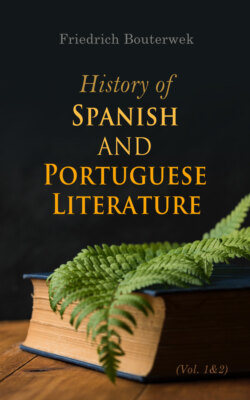Читать книгу History of Spanish and Portuguese Literature (Vol. 1&2) - Friedrich Bouterwek - Страница 13
На сайте Литреса книга снята с продажи.
ALPHONSO X.; HIS LITERARY MERITS—NICOLAS AND ANTONIO DE LOS ROMANCES, &c.
ОглавлениеTable of Contents
The names of several early writers of rude Castilian verse are recorded by different authors. A notice, however, of the literary merits of Alphonso X. called the Wise, by which is meant the learned, forms the most suitable commencement for a history of Spanish poetry. This sovereign, who was a very extraordinary man, for the age in which he lived, was ambitious, among his other distinctions, of being a poet. Scarcely any romance or song of true poetic feeling can be attributed to him; but he loved to embody his science and learning in verse. He disclosed his Alchymical Secrets in the dactylic stanzas, called versos de arte mayor. Alchymy was his favourite study; and if his assertions in verse may be relied on, he several times made gold, and in times of difficulty turned his power of producing that precious metal to his own advantage. His verses are, in some degree, harmonious, and ingeniously constructed; but no trait of poetic description enlivens the dry and uninteresting precepts he details.31 It is not, therefore, on account of his rhymes that Alphonso the Wise deserves to be placed at the head of the Castilian poets. His claim to occupy that station can only be founded on the attention he devoted to the cultivation of the Castilian language, an attention which is easily recognized even in his unpoetic verses, and which could not fail to prove a most powerful incitement to emulation, since he who set the example was the king of the country, and possessed a reputation for learning which was flattering to the national pride. The greater purity and precision which was thus introduced into the dialect of Castile and Leon, enabled the poetic genius of the nation to unfold itself with increasing vigour and freedom. But the benefits which Alphonso conferred on the Spanish language and literature, did not stop here. The bible was, by his command, rendered into Castilian; and a Paraphrase of Scripture History accompanied the translation. A General Chronicle of Spain, and a History of the Conquest of the Holy Land, founded on the work of William of Tyre, were also written by his order. Finally, he introduced the use of the national language into legal and judicial proceedings. No direct interest was, however, taken by Alphonso in the improvement of the popular Castilian poetry. He probably thought it too destitute of art and learning to deserve much consideration. It appears to have been on this account, and not from vanity, that he favoured the Troubadours, assembled at his court, in whose more elegant verse his praises were unceasingly proclaimed.32 His influence had an extensive operation; but his death, which happened in the year 1284, was no loss to the national bards of Castile, who still sung their Romances in obscurity.
The history of Spanish poetry continues barren of names until towards the end of the fourteenth century; and yet, according to all literary probability, the greater part of the ancient Castilian romances, which have, in the progress of time, been collected, and have undergone more or less improvement, were composed at a much earlier period. One Nicolas, and an abbot named Antonio, are mentioned as celebrated writers of romances in the thirteenth century, anterior to the reign of Alphonso X.33 But until the period of the invention of printing, no regard was paid by the learned, or by those who wished to be considered learned, to popular ballads; and when the attention of men of letters began at last to be directed to the old romances, the authors were either forgotten, or no trouble was taken to preserve or recover their names. With a view, therefore, to the convenience of historical arrangement, a particular account of the ancient romance poetry of Castile may, with propriety, be postponed until the period when the first instance of literary publicity, which was given to it, must be recorded. In the mean while, some little known, though not unimportant memorials of the state of poetical and rhetorical culture in the fourteenth century, may here be brought to recollection.
